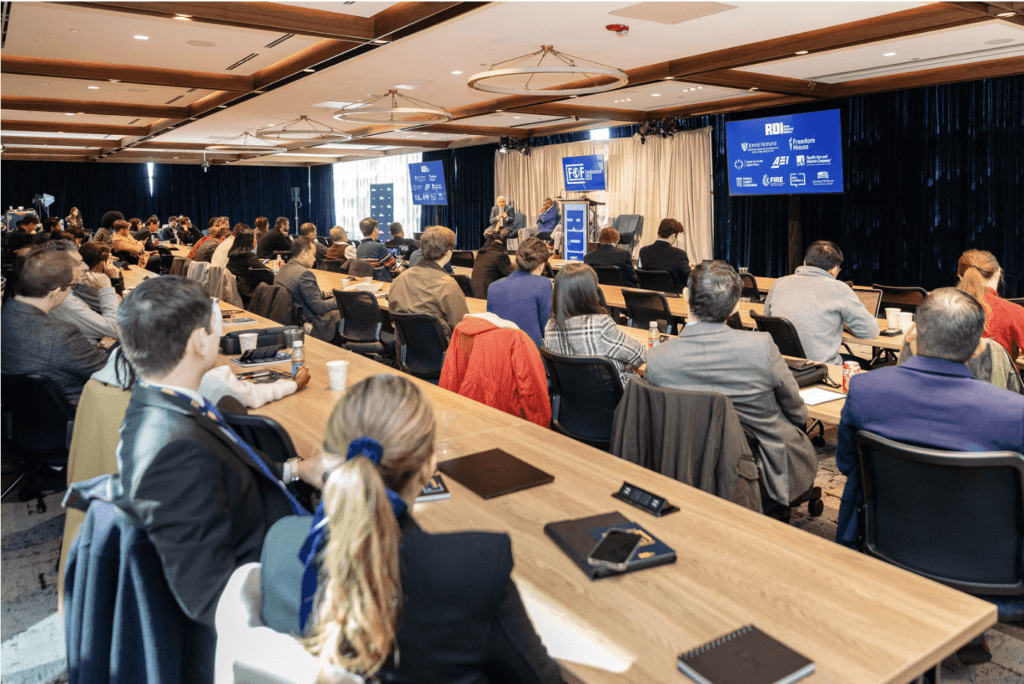RDI hosted the first Frontlines of Freedom Conference to combat transnational repression. By uniting various NGOs, policy experts, journalists, and business leaders with dozens of pro-democracy dissidents from around the world, we tackled the various ways foreign regimes threaten dissidents living in the United States and what Washington can do to protect them.
Day I: Morning Session
Freedom House: Understanding & Responding to Transnational Repression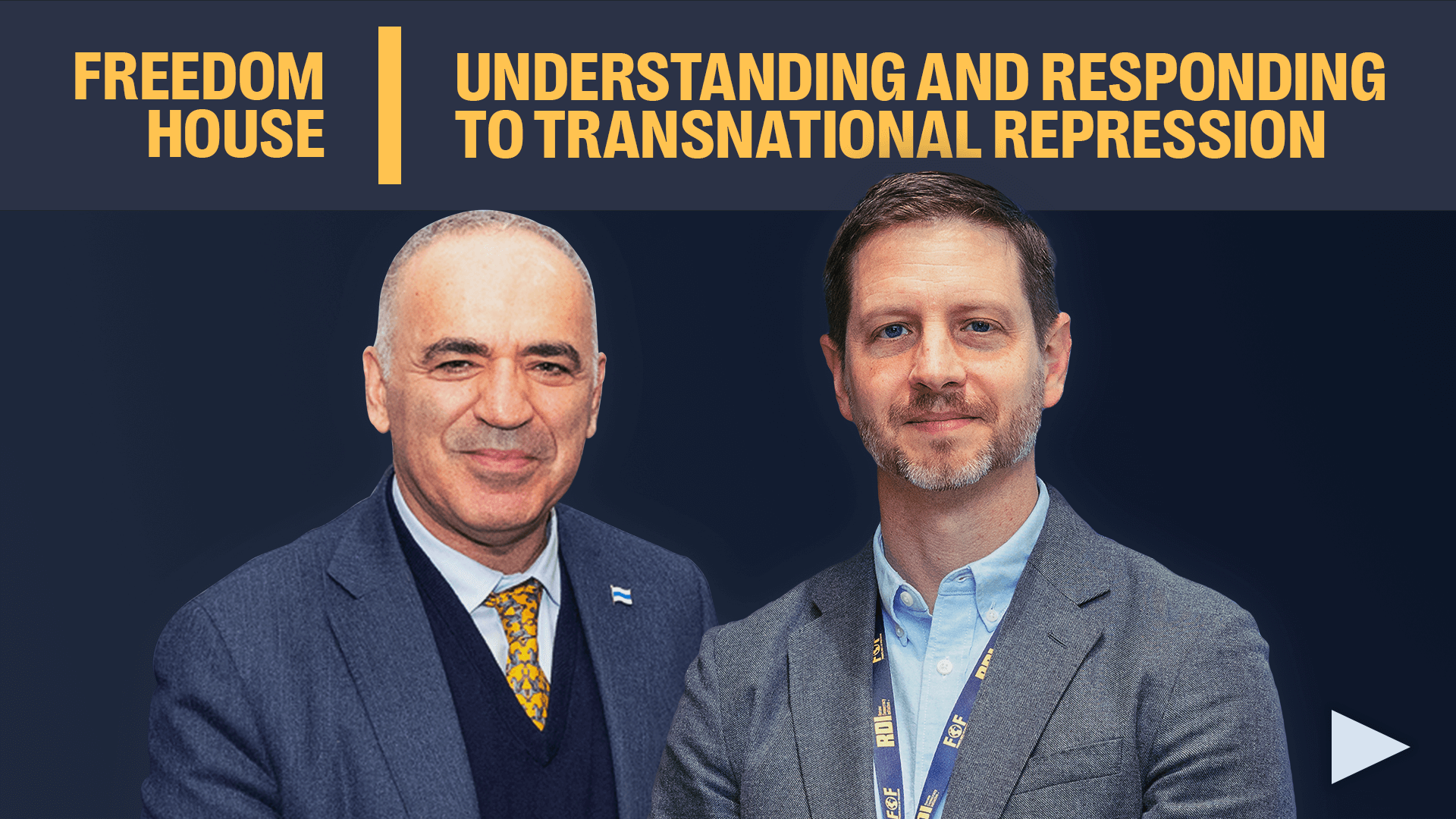 Since 2021, Freedom House has been publishing research on transnational repression, drawing global attention to the problem. Freedom House presented findings from its original research, explaining the global scale and scope of the problem, key trends, and emerging responses around the world.
Since 2021, Freedom House has been publishing research on transnational repression, drawing global attention to the problem. Freedom House presented findings from its original research, explaining the global scale and scope of the problem, key trends, and emerging responses around the world.
Speakers
Nate Schenkkan is senior director of research for Freedom House’s work on countering authoritarianism. From 2019-2021, he led Freedom House’s work on transnational repression—the targeting of dissidents and exiles abroad.
Evan Mawarire is director of the Frontlines of Freedom program at the Renew Democracy Initiative (RDI). He is the founder of the #ThisFlag movement in Zimbabwe, which confronted corruption, injustice, and poverty, and was instrumental in unseating Robert Mugabe.
Personally Targeted: The Faces of Transnational Repression
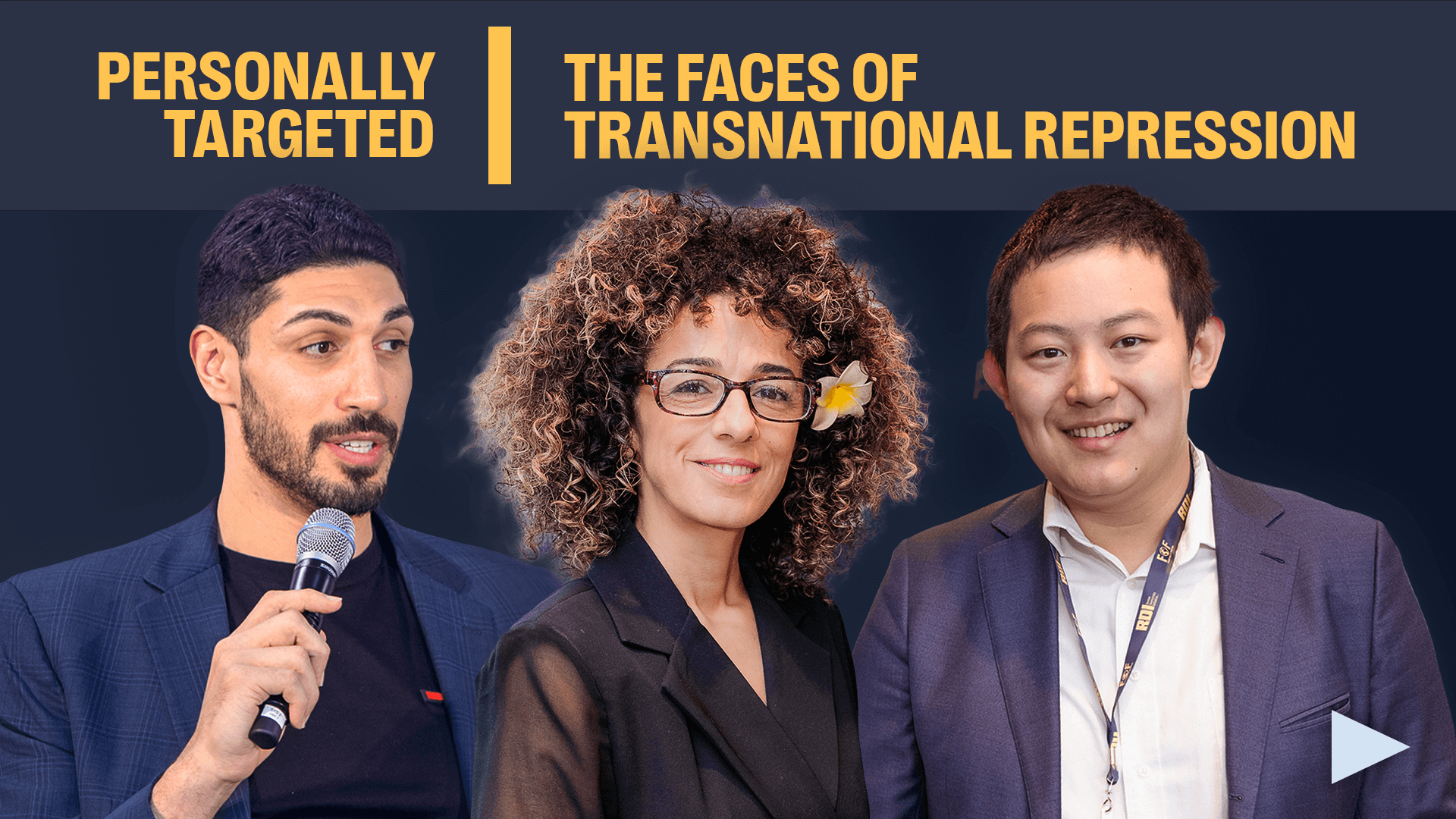 Democracy defenders from around the world shared their experiences with transnational repression.
Democracy defenders from around the world shared their experiences with transnational repression.
Speakers
Masih Alinejad is a journalist and human rights activist from Iran. Facing increasing risk for her work, Alinejad left Iran in 2009. In 2021 the regime tried to kidnap and assassinate Alinejad in New York for her continued activism. She is founder of White Wednesdays—a movement that opposes compulsory hijab, promotes freedom of choice for Iranian women, and fights the regime’s authoritarian grip on Iran and its citizens.
Enes Kanter Freedom is an American professional basketball player and political activist of Turkish origin. His criticism of the government of Turkey under Recep Erdoğan resulted in Turkey requesting his extradition and formally calling on Interpol to issue a red notice for his arrest in 2019. Since 2021 Freedom has increasingly advocated for increased freedoms in China, particularly for marginalized groups such as the Uyghur people.
Jinrey Zhang is a Georgetown law student from China who participated in DC protests against China’s zero-COVID policy and in support of the White Paper movement. As a result of his activism, he and his family in China have faced harassment by Chinese state authorities.
Evan Mawarire is director of the Frontlines of Freedom program at the Renew Democracy Initiative (RDI). He is the founder of the #ThisFlag movement in Zimbabwe, which confronted corruption, injustice, and poverty, and was instrumental in unseating Robert Mugabe.
Day I: Afternoon Sessions
Block I: 1:30pm-2:15pm
Weaponized Law: Foreign Legal Intimidation & Abuse
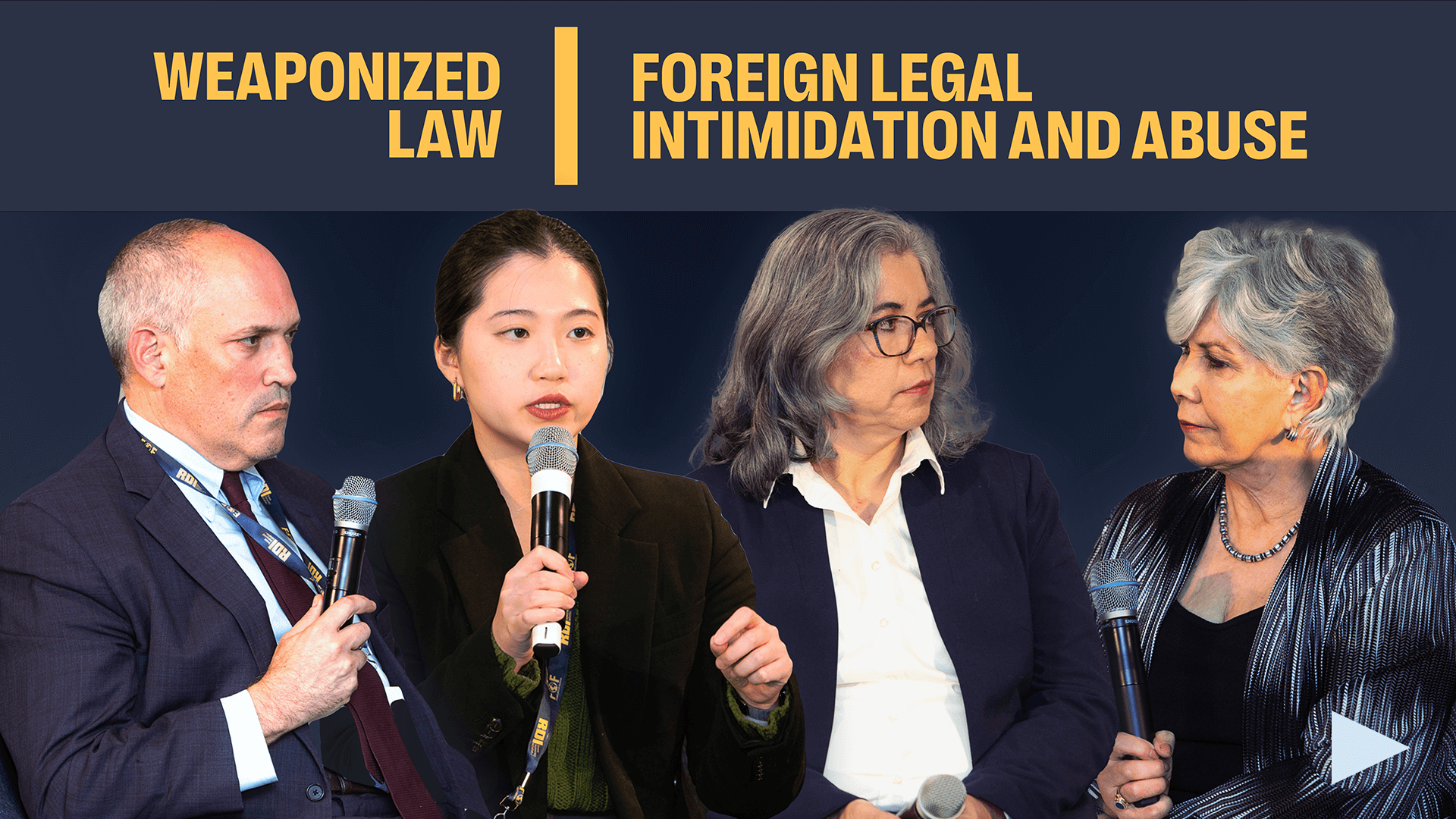 Authoritarian regimes manipulate legal processes and international institutions to silence dissent and increase the costs of activism around the world. How are they abusing the law and what can be done to stop them?
Authoritarian regimes manipulate legal processes and international institutions to silence dissent and increase the costs of activism around the world. How are they abusing the law and what can be done to stop them?
Speakers
Anna Kwok is the executive director of the Hong Kong Democracy Council (HKDC), a leading organization for advancing Hong Kong’s pro-democracy movement and supporting Hong Kongers in the United States. During Hong Kong’s 2019 protests, Kwok was an anonymous activist behind major international campaigns. She has continued her work advocating for Hong Kong despite being repeatedly threatened by the HKSAR government, which has issued a warrant for her arrest and placed a HK$1 million bounty on her head.
Michael Rubin is a senior fellow at the American Enterprise Institute (AEI), where he specializes in Iran, Turkey, and the broader Middle East. A former Pentagon official, Dr. Rubin has lived in post-revolution Iran, Yemen, and both pre and postwar Iraq. He also spent time with the Taliban before 9/11. For more than a decade, he taught classes at sea about the Horn of Africa and Middle East conflicts, culture, and terrorism, to deployed US Navy and Marine units.
Claudia Escobar is a legal scholar and former magistrate of the Court of Appeals of Guatemala. Following her second election to the Court of Appeals in 2014, she became the lead whistleblower in a case of grand corruption that revealed illegal interference in Guatemala’s judiciary by high-ranking political officials including the country’s vice-president and the former president of congress. Following a series of threats she received from the Guatemalan government, Escobar left Guatemala for the United States in 2015 to continue her legal work and advocacy for judicial independence.
Immigration Status: Protecting Freedom Fighters
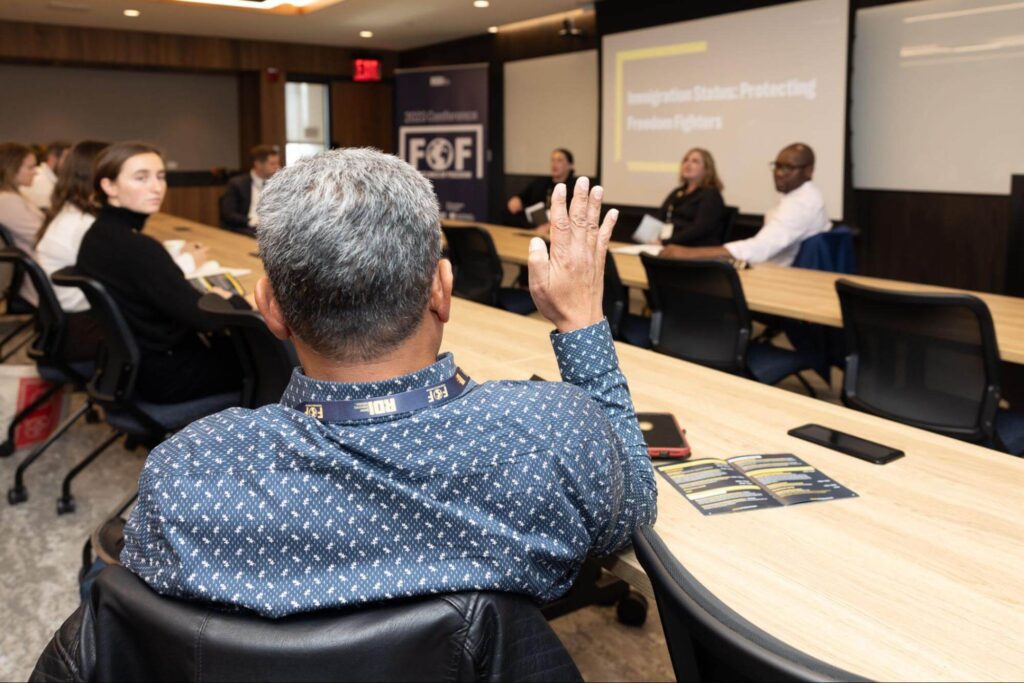
How can the American immigration system better accommodate political dissidents seeking refuge in the US?
Speakers
Evan Mawarire is director of the Frontlines of Freedom program at the Renew Democracy Initiative (RDI). He is the founder of the #ThisFlag movement in Zimbabwe, which confronted corruption, injustice, and poverty, and was instrumental in unseating Robert Mugabe.
Sarah Hager is an Amnesty International Country Specialist for Angola, Botswana, and Zimbabwe. She led a US-based lobbying effort for ratification of the African Union’s Internally Displaced Persons Convention and worked in South Africa at the Legal Aid Board where she assisted with criminal defense and appellate cases as well as civil litigation challenging violations of constitutional rights.
Kristie De Peña is the senior vice president for policy and director of immigration at the Niskanen Center. She focuses on immigration and national security law and policy.
Block II: 2:30pm-3:15pm
The Campus Battleground: Protecting Free Expression From Foreign Authoritarian Meddling
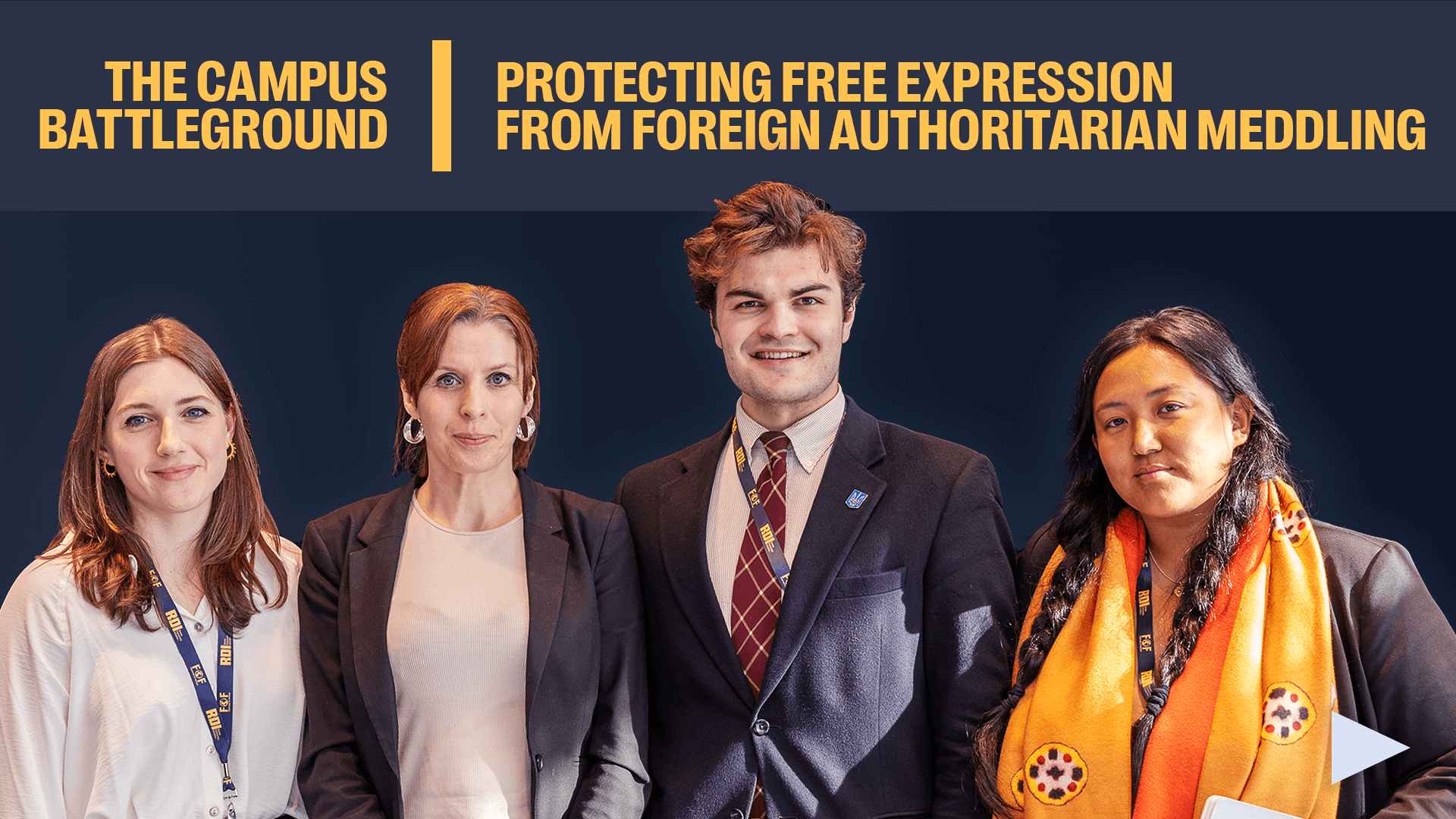 Students from unfree countries are targeted, surveilled, and intimidated out of exercising their right to free expression. What can colleges do to defend free speech on campuses?
Students from unfree countries are targeted, surveilled, and intimidated out of exercising their right to free expression. What can colleges do to defend free speech on campuses?
Speakers
Pema Doma is a Tibetan human rights activist, a Freedom Fellow at the Human Rights Foundation, and executive director of Students for a Free Tibet, a robust network of activists and young people fighting for a free and independent Tibet.
Sarah McLaughlin serves as Senior Scholar, Global Expression at FIRE, where she focuses on cross-border threats to free speech, especially on college campuses. She is the author of a forthcoming book on transnational repression in higher education, Authoritarians in the Academy, which will be published in 2024 with Johns Hopkins University Press.
Rory O’Connor is the chairman of the Athenai Institute—a nonprofit dedicated to dismantling the influence of the Chinese Communist Party on US college campuses.
Elisabeth Braw is a senior fellow at the American Enterprise Institute (AEI), where she focuses on defense against emerging national security challenges, such as hybrid and gray-zone threats. She is a columnist at Foreign Policy, writing on national security and the globalized economy; a member of the National Preparedness Commission (UK); a member of the steering committee of the Aurora Forum; and a member of the advisory board for GALLOS Technologies.
Foreign Surveillance, Data Collection, and Online Harassment
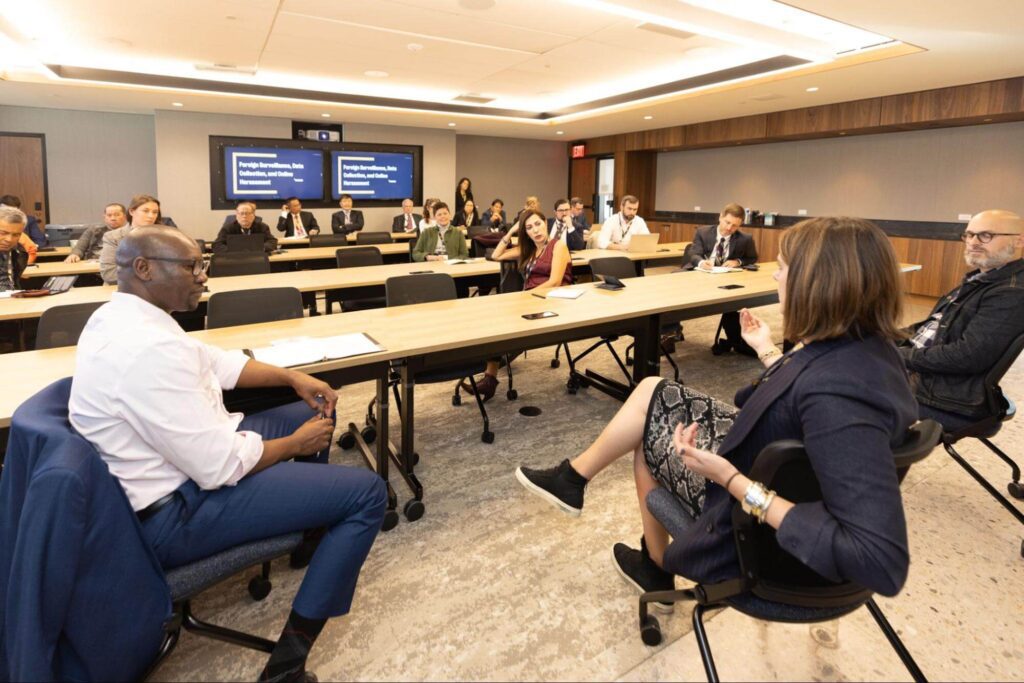 What can be done to shield activists and the general public from invasions of digital security and harassment?
What can be done to shield activists and the general public from invasions of digital security and harassment?
Speakers
Evan Mawarire is director of the Frontlines of Freedom program at the Renew Democracy Initiative (RDI). He is the founder of the #ThisFlag movement in Zimbabwe, which confronted corruption, injustice, and poverty, and was instrumental in unseating Robert Mugabe.
Michael Mosier is a partner in ex/ante, a venture fund investing in tools that counter authoritarianism and advance human agency through privacy, security, and information integrity. He co-founded Arktouros legal boutique of former federal prosecutors dedicated to civil society, emergent technology, and rule of law.
Lisa Kaplan is the chairman, founder, and chief executive officer of Alethea Group—a technology company dedicated to helping organizations navigate modern digital landscapes and protect themselves against disinformation.
Block III: 3:30pm-4:15pm
Empowering North Korean Escapees in the Fight Against Transnational Repression
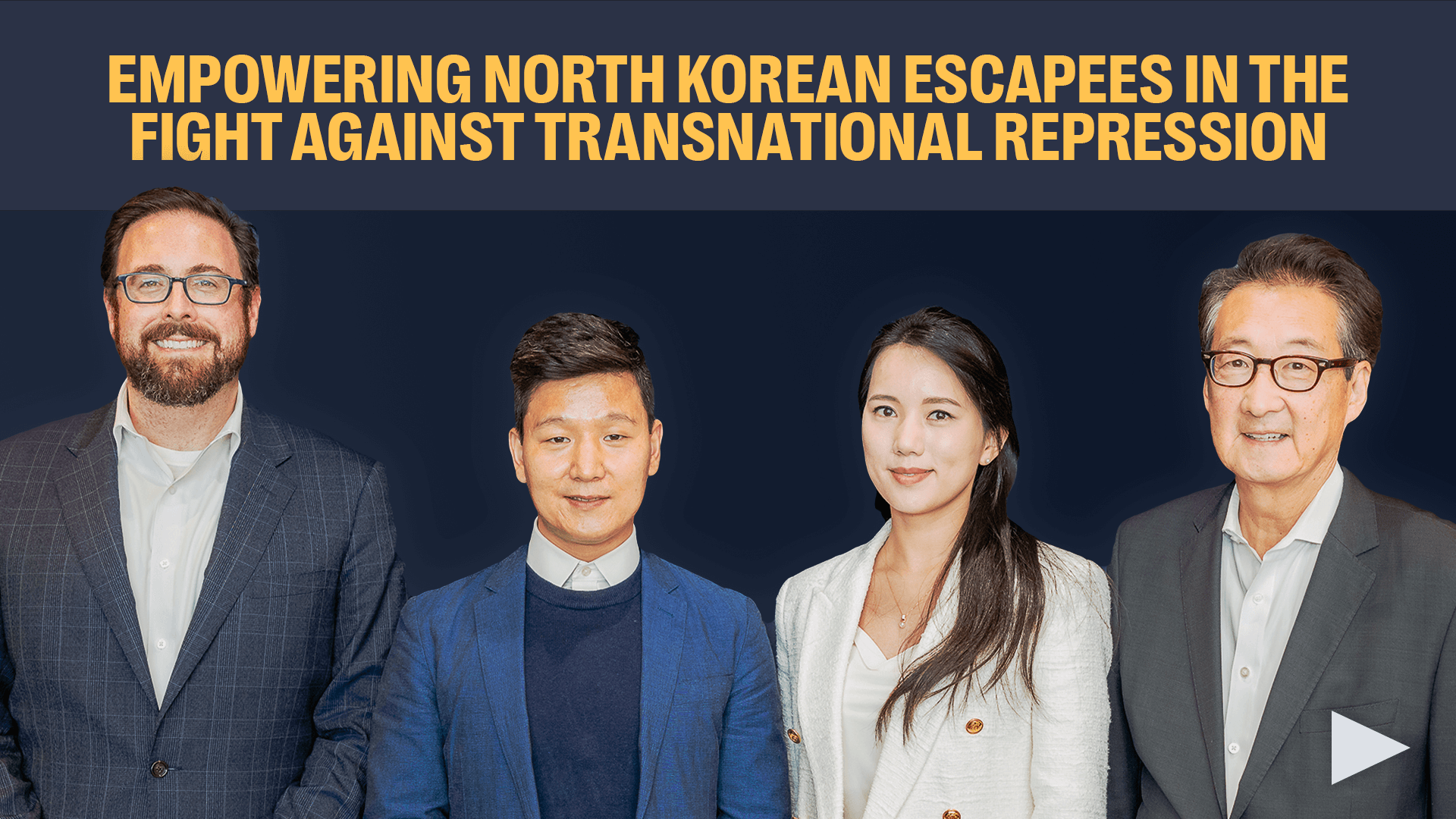 The Bush Institute led a session on three themes: how Pyongyang commits transnational repression against its people, how that repression is often facilitated by nations like China and Russia, and how North Korean escapees are being empowered to build new lives while also preparing for the day when they might return to their homeland and contribute to a free North Korea.
The Bush Institute led a session on three themes: how Pyongyang commits transnational repression against its people, how that repression is often facilitated by nations like China and Russia, and how North Korean escapees are being empowered to build new lives while also preparing for the day when they might return to their homeland and contribute to a free North Korea.
Speakers
Joseph Kim is an associate and expert-in-residence for the George W. Bush Institute’s freedom and democracy program. He was born and raised in North Korea. In 2006, he escaped to China and relocated to the US a year later. In 2013, He delivered a TED Talk on the importance of hope and published a memoir, “Under the Same Sky.”
Seohyun Lee is a North Korean defector, human rights advocate, and commentator. After experiencing a series of brutal purges by the Kim Jong Un regime, Seohyun’s family defected to South Korea and later resettled in the US in 2016. Since then, she has been committed to raising awareness of human rights abuses in North Korea and disseminating information to people inside the country.
Victor Cha is a senior fellow for the George W. Bush Institute’s freedom and democracy program where he helps lead an initiative on the problem of human rights in North Korea. He is Senior Vice President for Asia at CSIS and Professor of Government at Georgetown University. From 2004 to 2007, he served as Director for Asian Affairs at the White House on the National Security Council (NSC).
Chris Walsh is the director of the George W. Bush Institute’s freedom and democracy program where manages communications, evaluation, and public policy research projects that advance freedom and democracy in the world. He also develops and implements efforts to make the Bush Institute a welcoming place for today’s generation of dissidents and democracy advocates, overseeing visits for training, inspiration, and insight.
Block IV: 3:30pm-4:15pm
The Long Arm of the CCP: Chinese Interference in American Society
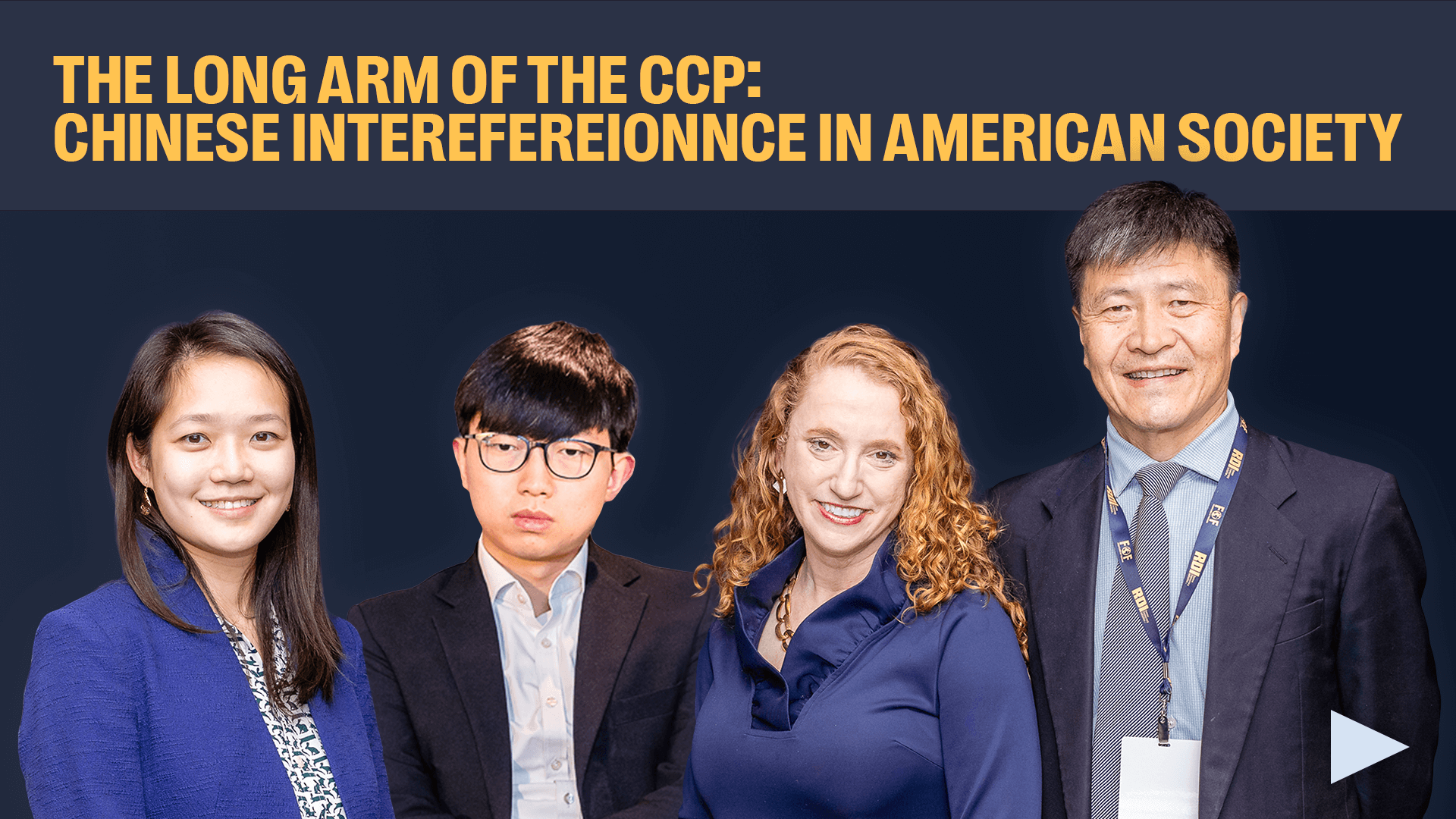 Untangling the web of Chinese influence campaigns.
Untangling the web of Chinese influence campaigns.
Speakers
Sunny Cheung is the co-founder and editor-in-chief of Flow HK Media, which aims to combat authoritarian propaganda and promote democracy by providing in-depth analysis and investigative reporting. He also leads multiple diasporic projects overseas and advises the Hong Kong Democracy Council (HKDC) on human rights issues and Chinese politics in Washington DC.
Fengsuo Zhou is a Chinese human rights advocate and the co-founder and current president of Humanitarian China. He was a student leader during the Tiananmen protests in 1989, and as a result, he spent a year in a high security prison in Qincheng, China.
Audrye Wong is a Jeane Kirkpatrick fellow at the American Enterprise Institute (AEI), where she focuses on China’s foreign policy, Asia-Pacific security issues, economic statecraft, and how authoritarian states use informational tools to alter public discourse and shape political processes in democracies—what she calls “informational statecraft.” She is also an assistant professor of political science and international relations at the University of Southern California.
Suzanne Nossel is chief executive officer at PEN America. She is the author of Dare to Speak: Defending Free Speech for All and previously served as the chief operating officer of Human Rights Watch and as executive director of Amnesty International USA.
James Lewis is director of programs at the Renew Democracy Initiative (RDI). He joined RDI from the Johns Hopkins School of Advanced International Studies where he worked as a research assistant for Senior Fellow Anne Applebaum.
Day II: Morning Sessions
How Transnational Repression Hurts Everyone’s Free Expression
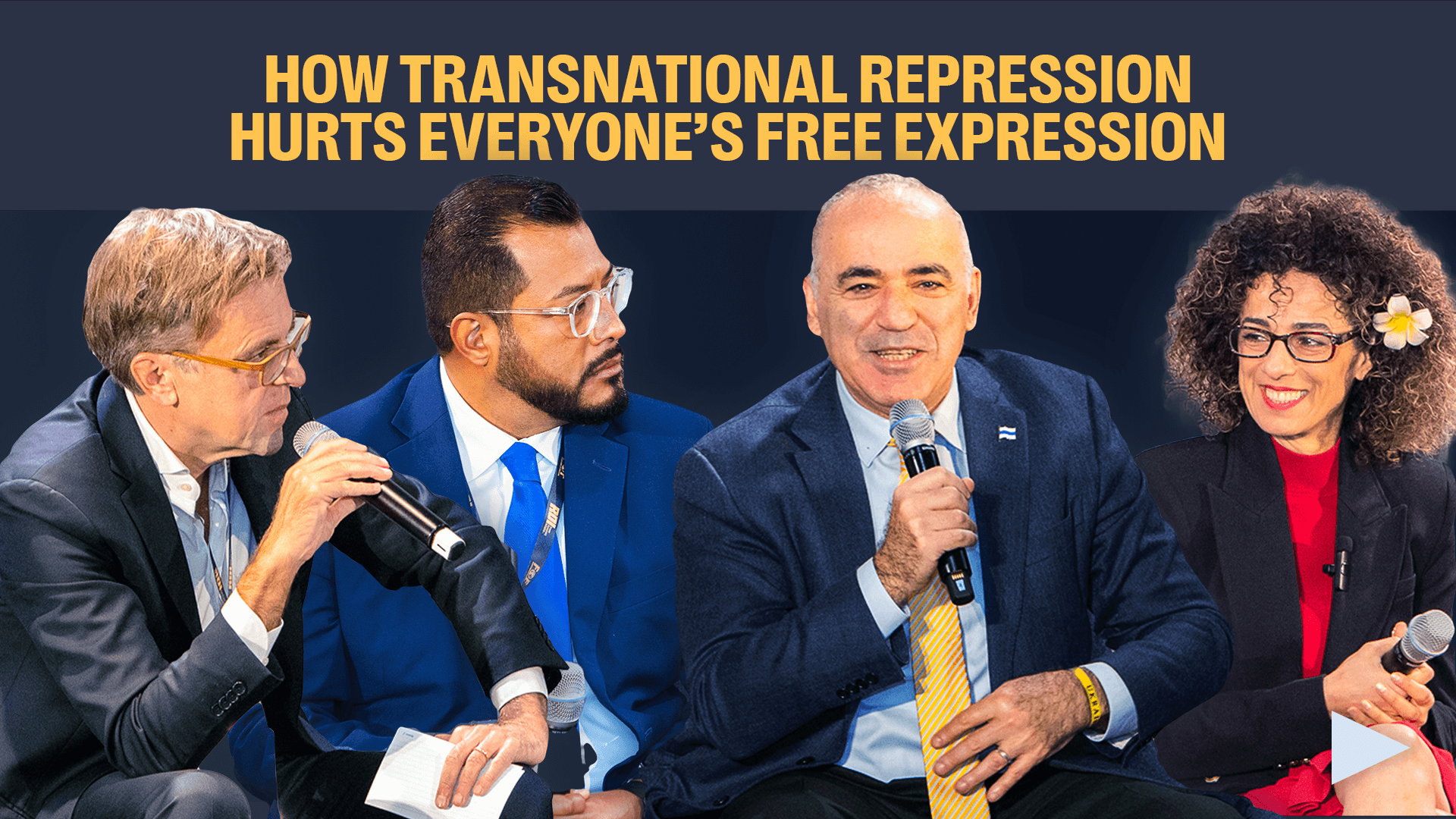 Authoritarian regimes tend to target exiled political activists, but how are the systems of surveillance and intimidation employed against activists affecting everyone’s freedoms?
Authoritarian regimes tend to target exiled political activists, but how are the systems of surveillance and intimidation employed against activists affecting everyone’s freedoms?
Speakers
Félix Maradiaga is a former presidential candidate and pro-democracy activist in Nicaragua. A prominent figure in Latin America, he is renowned for his expertise in nonviolent resistance and stands as an outspoken critic of dictator Daniel Ortega. Maradiaga was arrested in 2021 and held in a maximum security prison for nearly two years. In February 2023, he, along with 221 other prisoners, was released, declared stateless, and sent to the US.
Masih Alinejad is a journalist and human rights activist from Iran. Facing increasing risk for her work, Alinejad left Iran in 2009. In 2021 the regime tried to kidnap and assassinate Alinejad in New York for her continued activism. She is founder of White Wednesdays—a movement that opposes compulsory hijab, promotes freedom of choice for Iranian women, and fights the regime’s authoritarian grip on Iran and its citizens.
Garry Kasparov is chairman of the Renew Democracy Initiative (RDI). He is a former world chess champion and Russian opposition politician. He is the author of several books, including Winter Is Coming: Why Vladimir Putin and the Enemies of the Free World Must Be Stopped. He also serves as the chairman of the Human Rights Foundation.
Matthew Kaminski is the former editor-in-chief of POLITICO (2019-2023) and co-founder and editor-in-chief of POLITICO Europe (2014-2018).
Priorities for Congressional Action
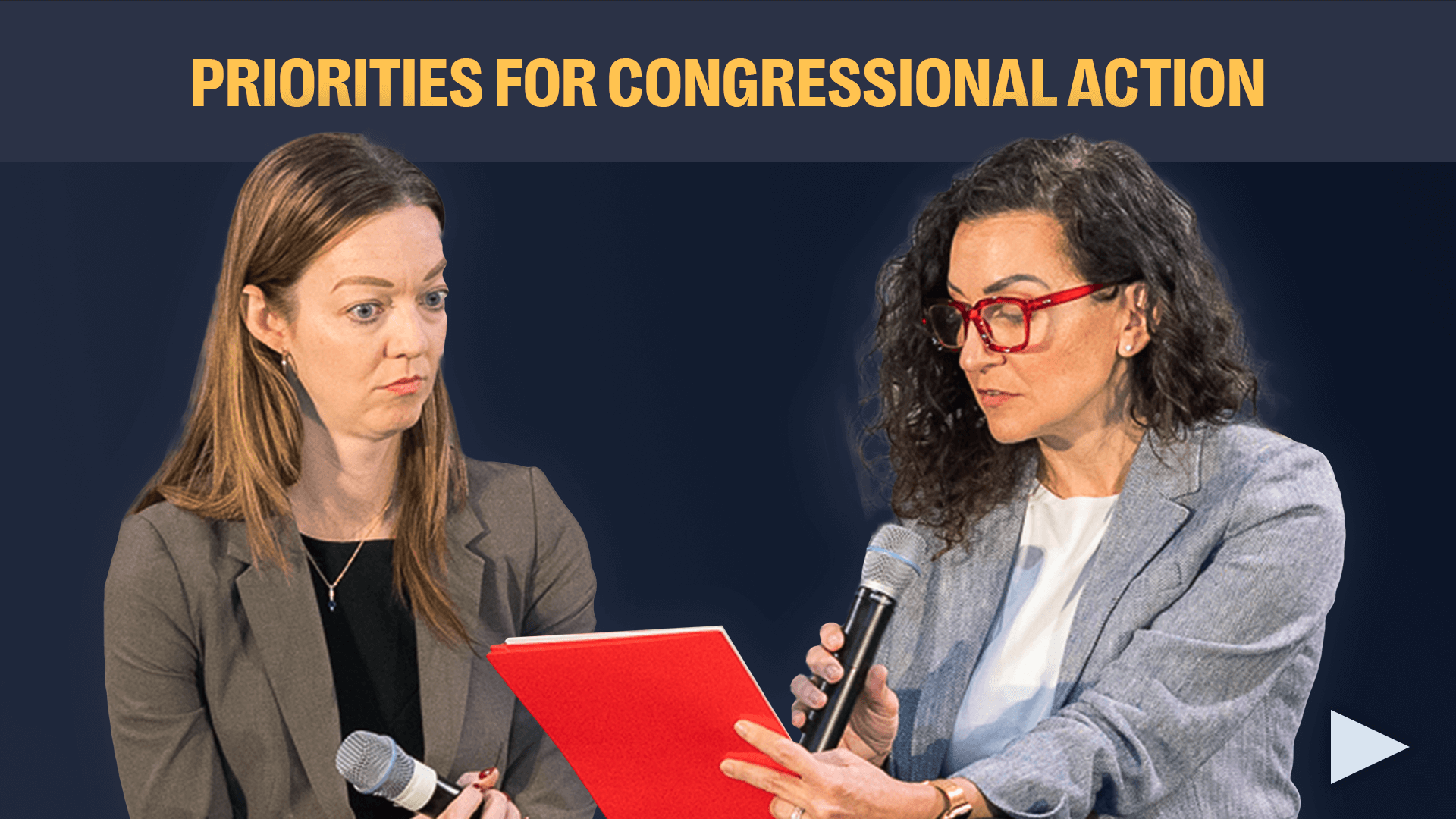 With various bills focused on combating transnational repression introduced to Congress over the past year, what should Congress prioritize and what is the best path forward?
With various bills focused on combating transnational repression introduced to Congress over the past year, what should Congress prioritize and what is the best path forward?
Speakers
Nadine Farid Johnson is the managing director of PEN America Washington and Free Expression Programs. In Washington, Nadine spearheads PEN America’s engagement with the United States government on free expression issues in the US and around the globe, focusing on matters of foreign policy, tech policy, privacy, press freedom, and educational censorship.
Annie Boyajian is vice president of policy and advocacy at Freedom House and serves as the Mark Palmer distinguished fellow. In these roles, she oversees Freedom House’s policy and advocacy work, leading engagement with governments and collaboration with human rights groups.
Nate Schenkkan is senior director of research for Freedom House’s work on countering authoritarianism. From 2019-2021, he led Freedom House’s work on transnational repression—the targeting of dissidents and exiles abroad.

